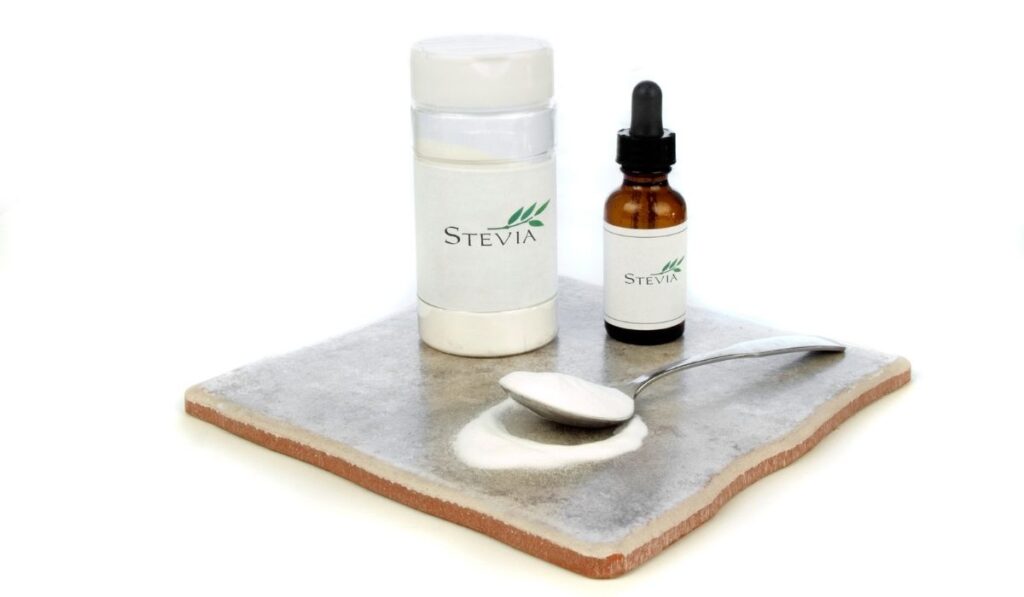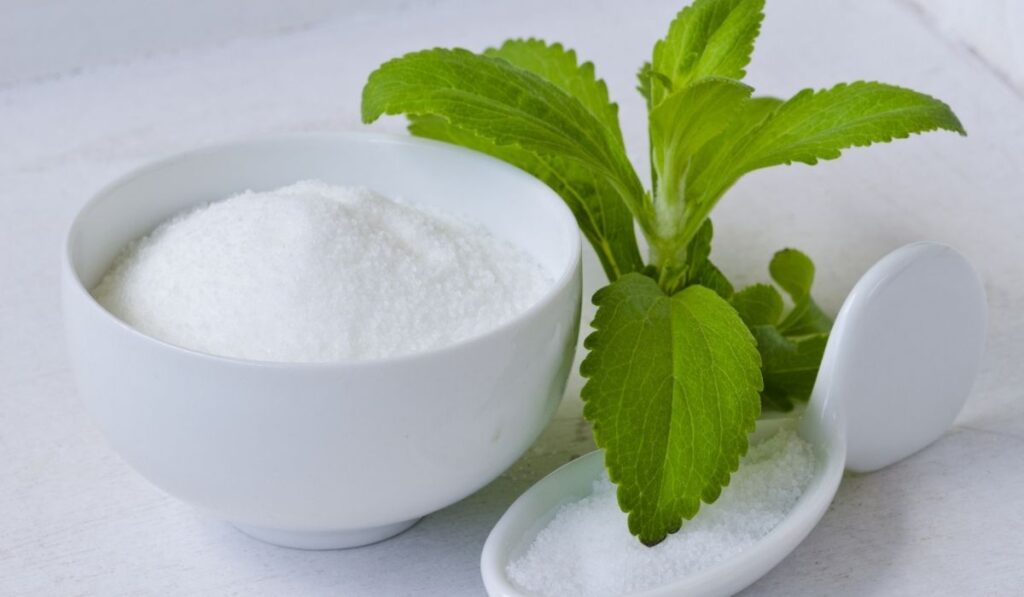Stevia is a great alternative to traditional sugars when it comes to oral health. While being sweeter than regular sugar, stevia is not acidic and therefore does not cause enamel erosion or cavities. It’s important however, to consume stevia in moderation.
Stevia gives you the sweetness you crave without being acidic. Because there’s no acid to react with the bacteria in your mouth, stevia won’t cause cavities and or gum diseases. Stevia has also been shown to clean plaque from your mouth. Nonetheless, consume stevia in moderation.
You can even find toothpastes that contain stevia, which makes them sweeter and tones down the minty taste. Stevia is also free from lactic acid, which is yet another cavity-causing element found in most sugary foods. Let’s take a closer look at stevia and how it affects your teeth.
The Relationship Between Stevia and Your Teeth

While the sweet sensation of sugar can taste amazing at times, it’s important to remember the damaging health effects of sugar, especially on your oral health. This is where artificial sweeteners such as stevia come in.
Stevia is a common option when looking for an alternative to sugar. It comes in various forms, including in packets, like these Stevia In The Raw Packets (on Amazon), or liquid, like the SweetLeaf Sweet Drops (also on Amazon).
Stevia is considered non-cariogenic because it does not contribute to tooth decay. Furthermore, it helps to work against tooth decay.
Usually when you consume anything sweetened with sugar, the pH levels in your mouth drop. This is because of the acidity levels. Stevia, however, does the opposite, and therefore helps to balance your salivary pH levels. Additionally, it also helps to decrease the harmful bacteria in your mouth.
While stevia can be up to 300 times sweeter than regular table sugar, it doesn’t mean it’s as bad for your teeth. There are no fermentable carbohydrates in stevia, which means it can’t activate the bacteria in your mouth.
Another cavity-causing element found in most sugary foods is lactic acid, and stevia is free from that as well.
Can Stevia Be Beneficial to Your Teeth?
Stevia is not only less harmful when compared to regular sugar — it can actually be beneficial for your teeth as well.
Tooth decay usually occurs when two elements come together: the bacteria that is already present in your mouth and fermentable carbohydrates such as starch and sugars. The mixture can activate the bacteria and start to erode the enamel of your tooth.
However, since stevia does not contain fermentable carbohydrates, it does not activate the bacteria in your mouth. Therefore, it prevents damage to the enamel of your teeth. According to research, stevia can be considered a non-acidogenic, which means it is appropriate enough to support oral health.
Moreover, stevia has also been shown to have surprising benefits for people suffering from diabetes. According to a study, diabetic rats that consumed stevia in place of sugar showed a significant reduction in their blood sugar levels.
Therefore, if you’re suffering from diabetes, you can consult your doctor and see about replacing any sugar with stevia.
With all that said, it’s also important to consider that stevia should not solely be consumed to improve your oral health. Some products with stevia in them can cause negative effects such as diarrhea. Beyond that, over consumption of anything can have negative effects.
Remember to keep your stevia intake at a moderate level.
Can Stevia Be Found in Toothpaste?
Many people find the rather strong taste of toothpaste off-putting. The minty taste can be overpowering, and a little hint of sweetness can not only help, but go a long way. Fortunately, there are toothpastes available with stevia, like Spry’s Peppermint Toothpaste (on Amazon).
Toothpastes with stevia make the product sweeter and healthier. It can also be a great alternative for toothpaste without sodium saccharin.
While we’re talking about toothpaste, it’s best to avoid ones that contain the following:
- Saccharin
- Sodium Lauryl Sulfate (SLS)
- Carrageenan
- Propylene Glycol
These substances have been linked to bladder cancer, toxicity, canker sores, gastrointestinal inflammation, damage to the central nervous system and other health concerns. This is another reason why toothpastes with natural ingredients and sweeteners such as stevia are indeed a great option.
Is Stevia Safe for Your Gums?

If you’re considering using stevia as opposed to regular sugar, there’s some more good news. Stevia is indeed safe for your gums, unlike traditional sugars that cause cavities and gum infections.
Stevia does not contain the acids that can start to demineralize the enamel of your teeth. Even though stevia can be a lot sweeter than sugar, it’s still relatively healthier when compared to the effects of regular sugar.
The high amount of sweetness in traditional sugars brings about high acidity levels. These acids react with the bacteria in your mouth and begin to deteriorate your tooth’s enamel.
Stevia, on the other hand, does not contain these acids, which means it has nothing to react with the bacteria in your mouth, giving you the sweetness while also being safe for your gums. Not only that, but stevia has also been shown to fight against plaque and even lower cholesterol levels.
While the positive effects of stevia are indeed incredible, it’s still very important to remember that it should always be consumed in moderation. Uncontrolled intake or consuming stevia just for oral treatment are both not recommended.


